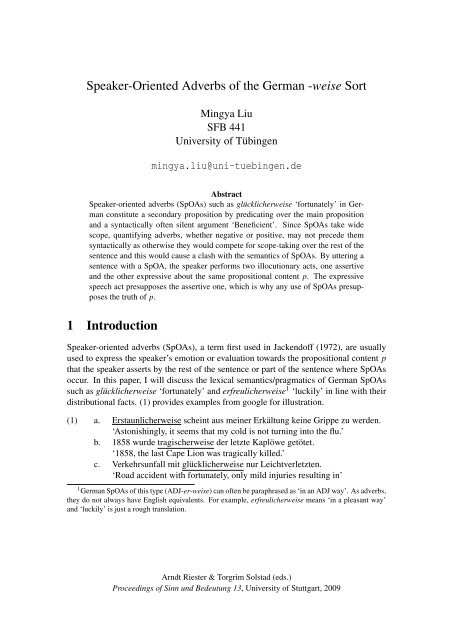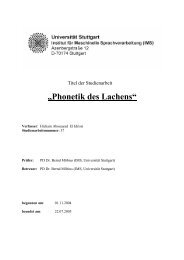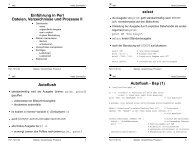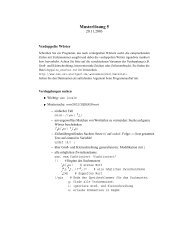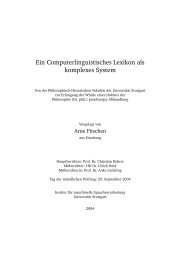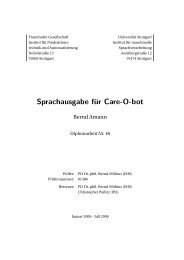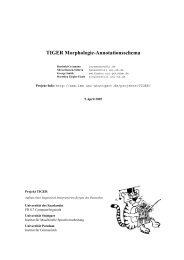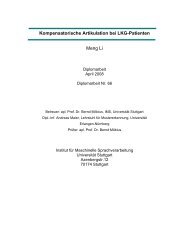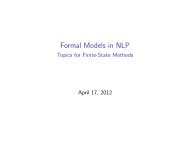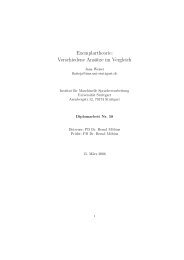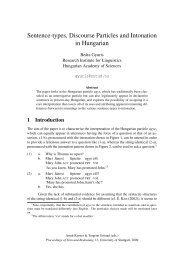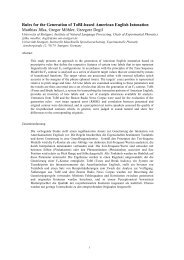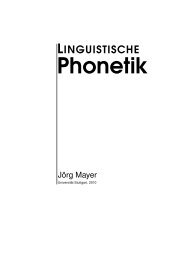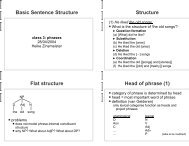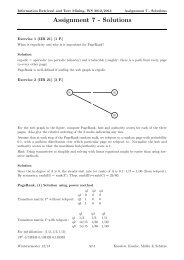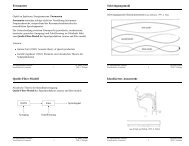Speaker-Oriented Adverbs of the German -weise Sort 1 ... - IMS
Speaker-Oriented Adverbs of the German -weise Sort 1 ... - IMS
Speaker-Oriented Adverbs of the German -weise Sort 1 ... - IMS
Create successful ePaper yourself
Turn your PDF publications into a flip-book with our unique Google optimized e-Paper software.
<strong>Speaker</strong>-<strong>Oriented</strong> <strong>Adverbs</strong> <strong>of</strong> <strong>the</strong> <strong>German</strong> -<strong>weise</strong> <strong>Sort</strong><br />
Mingya Liu<br />
SFB 441<br />
University <strong>of</strong> Tübingen<br />
mingya.liu@uni-tuebingen.de<br />
Abstract<br />
<strong>Speaker</strong>-oriented adverbs (SpOAs) such as glücklicher<strong>weise</strong> ‘fortunately’ in <strong>German</strong><br />
constitute a secondary proposition by predicating over <strong>the</strong> main proposition<br />
and a syntactically <strong>of</strong>ten silent argument ‘Beneficient’. Since SpOAs take wide<br />
scope, quantifying adverbs, whe<strong>the</strong>r negative or positive, may not precede <strong>the</strong>m<br />
syntactically as o<strong>the</strong>rwise <strong>the</strong>y would compete for scope-taking over <strong>the</strong> rest <strong>of</strong> <strong>the</strong><br />
sentence and this would cause a clash with <strong>the</strong> semantics <strong>of</strong> SpOAs. By uttering a<br />
sentence with a SpOA, <strong>the</strong> speaker performs two illocutionary acts, one assertive<br />
and <strong>the</strong> o<strong>the</strong>r expressive about <strong>the</strong> same propositional content p. The expressive<br />
speech act presupposes <strong>the</strong> assertive one, which is why any use <strong>of</strong> SpOAs presupposes<br />
<strong>the</strong> truth <strong>of</strong> p.<br />
1 Introduction<br />
<strong>Speaker</strong>-oriented adverbs (SpOAs), a term first used in Jackend<strong>of</strong>f (1972), are usually<br />
used to express <strong>the</strong> speaker’s emotion or evaluation towards <strong>the</strong> propositional content p<br />
that <strong>the</strong> speaker asserts by <strong>the</strong> rest <strong>of</strong> <strong>the</strong> sentence or part <strong>of</strong> <strong>the</strong> sentence where SpOAs<br />
occur. In this paper, I will discuss <strong>the</strong> lexical semantics/pragmatics <strong>of</strong> <strong>German</strong> SpOAs<br />
such as glücklicher<strong>weise</strong> ‘fortunately’ and erfreulicher<strong>weise</strong> 1 ‘luckily’ in line with <strong>the</strong>ir<br />
distributional facts. (1) provides examples from google for illustration.<br />
(1) a. Erstaunlicher<strong>weise</strong> scheint aus meiner Erkältung keine Grippe zu werden.<br />
‘Astonishingly, it seems that my cold is not turning into <strong>the</strong> flu.’<br />
b. 1858 wurde tragischer<strong>weise</strong> der letzte Kaplöwe getötet.<br />
‘1858, <strong>the</strong> last Cape Lion was tragically killed.’<br />
c. Verkehrsunfall mit glücklicher<strong>weise</strong> nur Leichtverletzten.<br />
‘Road accident with fortunately, only mild injuries resulting in’<br />
1 <strong>German</strong> SpOAs <strong>of</strong> this type (ADJ-er-<strong>weise</strong>) can <strong>of</strong>ten be paraphrased as ‘in an ADJ way’. As adverbs,<br />
<strong>the</strong>y do not always have English equivalents. For example, erfreulicher<strong>weise</strong> means ‘in a pleasant way’<br />
and ‘luckily’ is just a rough translation.<br />
Arndt Riester & Torgrim Solstad (eds.)<br />
Proceedings <strong>of</strong> Sinn und Bedeutung 13, University <strong>of</strong> Stuttgart, 2009
334 Mingya Liu<br />
d. Die gekürzte Studi<strong>of</strong>assung wurde unglaublicher<strong>weise</strong> OHNE(!) die Musik<br />
von Ennio Morricone in den USA veröffentlicht.<br />
‘The shortened studio version got published in <strong>the</strong> USA, unbelievably, without<br />
<strong>the</strong> music <strong>of</strong> Ennio Morricone.’<br />
The paper is organized as follows. I will first provide an overview about <strong>the</strong> distribution<br />
<strong>of</strong> SpOAs. Section 3 addresses two previous analyses, one that treats SpOAs as<br />
positive polarity items (PPIs) (Nilsen 2004, Ernst 2005) and <strong>the</strong> o<strong>the</strong>r that takes <strong>the</strong> relation<br />
between <strong>the</strong> main proposition p and SpOAs as conditional (Bonami and Godard<br />
2008): p → SpOA(p). I will argue that <strong>the</strong> PPI-labeling <strong>of</strong> SpOAs is misleading if not<br />
entirely wrong and <strong>the</strong> conditional semantics for SpOAs is not right, ei<strong>the</strong>r. In Section<br />
4, I will first discuss <strong>the</strong> semantics <strong>of</strong> SpOAs in <strong>the</strong> double-propositional approach<br />
following Bellert (1977) and Bach (1999) and <strong>the</strong>n propose that by use <strong>of</strong> SpOAs <strong>the</strong><br />
speaker performs two illocutionary acts, one assertive and <strong>the</strong> o<strong>the</strong>r expressive <strong>of</strong> <strong>the</strong><br />
same propositional content p. Most crucially, <strong>the</strong> expressive speech act presupposes <strong>the</strong><br />
assertive one, and this is why any use <strong>of</strong> SpOAs presupposes <strong>the</strong> truth <strong>of</strong> p. Section 5<br />
concludes <strong>the</strong> paper.<br />
2 Distribution <strong>of</strong> SpOAs<br />
To my knowledge, although <strong>the</strong> study <strong>of</strong> positive polarity dates back as early as Bolinger<br />
(1960), PPIs only started to gain more attention recently. As counterparts <strong>of</strong> NPIs, PPIs<br />
tend not to occur in downward entailing (Ladusaw 1980), henceforth DE, contexts, illustrated<br />
below:<br />
(2) a. Mary has *(not) got married yetNPI.<br />
b. Mary has (*not) alreadyPPI got married.<br />
Nilsen (1999) claims that SpOAs are PPIs as <strong>the</strong>y are excluded in DE contexts. The<br />
corpus search and speaker judgement experiments 2 (Liu and Soehn in press) confirmed<br />
<strong>the</strong>ir ‘PPI-hood’: 24 subjects all accepted (3a) and all rejected (3b), for example.<br />
(3) a. Die Vorschule hat glücklicher<strong>weise</strong> einen tollen Spielplatz.<br />
b. *Die Vorschule hat nicht glücklicher<strong>weise</strong> einen tollen Spielplatz.<br />
‘The pre-school has (*not) fortunately a great playground.’<br />
According to Bellert (1977), besides negatives, SpOAs do not appear in hypo<strong>the</strong>ticals,<br />
questions or performative sentences, ei<strong>the</strong>r. Her observation holds true for <strong>the</strong> most<br />
part, as shown in <strong>the</strong> following examples. The reason why SpOAs can appear in <strong>the</strong><br />
antecedent <strong>of</strong> conditionals or unreal (echo or tag) questions will be explicated later in<br />
<strong>the</strong> paper when we turn to <strong>the</strong>ir semantics.<br />
2 The experiments used anti-additive (AA) contexts as stimuli as according to Szabolcsi (2004), it is<br />
anti-additivity, a subset <strong>of</strong> DEness, that PPIs are sensitive to.
<strong>German</strong> <strong>Speaker</strong>-<strong>Oriented</strong> <strong>Adverbs</strong> 335<br />
(4) Conditionals:<br />
a. indicative: [Wenn...?SpOA...,... ∗ SpOA...]<br />
Wenn die Vorschule ?glücklicher<strong>weise</strong> einen tollen Spielplatz hat, können<br />
die Kinder *erfreulicher<strong>weise</strong> mehr Sport treiben.<br />
‘If <strong>the</strong> preschool fortunately has a great playground, <strong>the</strong> kids can luckily do<br />
more sports.’<br />
b. counterfactual: [Wenn... ∗ SpOAs...,... ∗ SpOAs...]<br />
Wenn die Schule *glücklicher<strong>weise</strong> einen tollen Spielplatz hätte, könnten<br />
die Kinder *erfreulicher<strong>weise</strong> mehr Sport treiben.<br />
‘If <strong>the</strong> preschool fortunately had a great playground, <strong>the</strong> kids could luckily<br />
do more sports.’<br />
(5) Questions:<br />
a. Hat die Vorschule *glücklicher<strong>weise</strong> einen tollen Spielplatz?<br />
‘Does <strong>the</strong> preschool fortunately has a great playground?’<br />
b. Wer ist unglücklicher<strong>weise</strong> in einen Unfall verwickelt worden?<br />
‘Who (again) unfortunately got into an accident?’<br />
c. Tom ist unglücklicher<strong>weise</strong> in der Prüfung durchgefallen, gell?<br />
‘Tom unfortunately failed in <strong>the</strong> exam, right?’<br />
(6) Performatives:<br />
Ich befehle *glücklicher<strong>weise</strong> dass Du s<strong>of</strong>ort losfährst.<br />
‘I order fortunately that you set <strong>of</strong>f immediately.’<br />
As (3)-(6) show, SpOAs cannot be negated, questioned or hypo<strong>the</strong>sized, which makes<br />
<strong>the</strong>m different from manner adverbs and degree adverbs such as ganz ‘entirely’, deutlich<br />
‘clearly’ that can.<br />
Ernst (2005), also labeling SpOAs as PPIs, maintains that <strong>the</strong>y are excluded in nonveridical<br />
(Zwarts 1995, Giannakidou 1998) contexts, which also include for instance<br />
imperatives or modals besides DE ones.<br />
(7) Imperatives:<br />
Stirb *unglücklicher<strong>weise</strong>!<br />
‘Die unfortunately!’<br />
SpOAs, meeting modal adverbs or verbs, must outscope <strong>the</strong>m.<br />
(8) a. Unglücklicher<strong>weise</strong> ist Peter möglicher<strong>weise</strong> krank.<br />
‘Unfortunately, Peter is possibly sick.’<br />
b. *Möglicher<strong>weise</strong> ist Peter unglücklicher<strong>weise</strong> krank.<br />
Possibly, Peter is unfortunately sick.<br />
c. Peter könnte unglücklicher<strong>weise</strong> krank sein. =<br />
Es ist unglücklich dass . . . �=<br />
Es könnte unglücklich sein dass . . .<br />
‘Unfortunately, Peter could be sick.’ = ‘It is unfortunate that . . . ’ �= ‘It<br />
could be unfortunate that . . . ’
336 Mingya Liu<br />
Finally, SpOAs can be embedded by veridical/factive predicates such as wissen ‘know’,<br />
bedauern ‘regret’ or reportives such as sagen ‘say’ but not by nonveridical predicates<br />
such as neg-raising 3 or volitional ones.<br />
(9) a. Factives:<br />
Maria weiß (nicht) dass Peter unglücklicher<strong>weise</strong> gestorben ist.<br />
‘Maria does (not) know that Peter unfortunately died.’<br />
b. Assertives:<br />
Maria sagte (nicht) dass Peter unglücklicher<strong>weise</strong> gestorben war.<br />
‘Maria did (not) say that Peter unfortunately died.’<br />
c. Neg-raising predicates:<br />
Maria glaubt (*nicht) dass Peter unglücklicher<strong>weise</strong> gestorben ist.<br />
‘Maria does (*not) believe that Peter had unfortunately died.’<br />
d. Volitionals:<br />
Maria h<strong>of</strong>ft (nicht) dass Peter *tragischer<strong>weise</strong> gestorben ist.<br />
‘Maria does (not) hope that Peter tragically died.<br />
I will come back to <strong>the</strong>se data in <strong>the</strong> following discussion.<br />
3 Two Misconceptions about SpOAs<br />
This section discusses two previous analyses, namely, <strong>the</strong> conditional semantics for<br />
French evaluatives by Bonami and Godard (2008) and <strong>the</strong> PPI-labeling <strong>of</strong> SpOAs by<br />
Nilsen (1999) and Ernst (2005). I will first show that although Bonami and Godard’s<br />
proposal correctly predicts some <strong>of</strong> SpOAs’ behavior, it fails to do so for some o<strong>the</strong>rs.<br />
This also leads to my argument for abandoning <strong>the</strong> PPI-labeling <strong>of</strong> SpOAs.<br />
3.1 Conditional semantics for SpOAs<br />
According to Bonami and Godard (2008), <strong>the</strong> oddness <strong>of</strong> French evaluatives (what we<br />
call SpOAs in <strong>the</strong> present paper) like malheureusement ‘unfortunately’ in <strong>the</strong> scope <strong>of</strong><br />
negation (such as *Paul n’est pas malheureusement venu ‘Paul did not unfortunately<br />
come’) is due to <strong>the</strong> clash between <strong>the</strong> “main assertion” ¬p and <strong>the</strong> “ancillary commitment”<br />
p → SpOA(p). This analysis can elegantly explain <strong>the</strong> anti-collocaitonal relation<br />
between SpOAs and negative contexts. However, it fails to account for <strong>the</strong> fact that even<br />
when preceding adverbs are not negative, such as immer ‘always’, thus a clash should<br />
not arise as <strong>the</strong> ‘main assertion’ is positive, <strong>the</strong> sentences still remain bad. Compare:<br />
(10) a. Peter ist unglaublicher<strong>weise</strong> immer/niemals/<strong>of</strong>t/manchmal krank.<br />
‘Peter is unbelievably always/never/<strong>of</strong>ten/sometimes sick.’<br />
b. *Peter ist immer/niemals/<strong>of</strong>t/manchmal unglaublicher<strong>weise</strong> krank.<br />
‘Peter is always/never/<strong>of</strong>ten/sometimes unbelievably sick.’<br />
3 Frank Richter (p.c.) pointed out to me that (9c) is not quite good an example, mainly due to <strong>the</strong> fact<br />
that <strong>the</strong> neg-raising reading <strong>of</strong> glauben ‘believe’ is sometimes difficult to distinguish from <strong>the</strong> non-negraising<br />
reading. If it is not a neg-raising reading <strong>the</strong>n (9c) would be just as fine as (9a-b), whe<strong>the</strong>r negation<br />
is present or not.
<strong>German</strong> <strong>Speaker</strong>-<strong>Oriented</strong> <strong>Adverbs</strong> 337<br />
An explanatory analysis <strong>of</strong> SpOAs should be able to answer <strong>the</strong> question ei<strong>the</strong>r why<br />
adverbs such as immer ‘always’, nie ‘never’, selten ‘seldom’ cannot outscope SpOAs, or<br />
why SpOAs cannot outscope <strong>the</strong>se adverbs if <strong>the</strong>y take a syntactically higher position,<br />
although <strong>the</strong>y can outscope for example, nichts ‘nothing’, niemand ‘nobody’, wenig<br />
‘few’, or modals.<br />
(11) a. Niemand hat erfreulicher<strong>weise</strong> bei der Hochzeit gefehlt. =<br />
Erfreulicher<strong>weise</strong> hat niemand bei der Hochzeit gefehlt.<br />
‘Happily, nobody was absent from <strong>the</strong> wedding.’<br />
b. Peter könnte unglaublicher<strong>weise</strong> gut angezogen sein. =<br />
Unglaublicher<strong>weise</strong> könnte Peter gut angezogen sein.<br />
‘Unbelievably, Peter could be well-dressed.’<br />
Such adverbs that SpOAs tend only to outscope (both semantically and syntactically)<br />
are called quantifying adverbs (Lewis 2002/1975). More examples from English are<br />
invariably, universally, without exception, occasionally, usually, mostly, generally, infrequently,<br />
rarely. They quantify over cases (which might as well simply be events). For<br />
example, always in A man who owns a donkey always beats it now and <strong>the</strong>n is a quantifier<br />
over <strong>the</strong> case: [if x is a man, if y is a donkey, and if x owns y, x beats y now and<br />
<strong>the</strong>n]. To figure out <strong>the</strong> semantics <strong>of</strong> SpOAs, it is helpful to take quantifying adverbs as<br />
a test and see how <strong>the</strong>y behave in relation to SpOAs in a sentence.<br />
I have three points to make on why <strong>the</strong> quantification by <strong>the</strong>se adverbs has to happen<br />
before <strong>the</strong> semantics <strong>of</strong> SpOAs comes into play. First, SpOAs are not quantifiable <strong>the</strong>mselves<br />
as <strong>the</strong>y are not cases: what <strong>the</strong>y express is not for example an event but an (<strong>of</strong>ten<br />
emotional) evaluation. This blocks SpOAs from being bound alone in <strong>the</strong> scope <strong>of</strong><br />
quantifying adverbs. Second, quantifying adverbs cannot quantify over <strong>the</strong> event or case<br />
expressed by <strong>the</strong> rest <strong>of</strong> <strong>the</strong> sentence, if <strong>the</strong> latter is already modified by a SpOA, because<br />
such a case is closed (by evaluation), that is, <strong>the</strong> truth value <strong>of</strong> <strong>the</strong> expressed proposition<br />
is already settled and thus allows no fur<strong>the</strong>r quantification (that should be considered to<br />
yield <strong>the</strong> truth-value). Last, <strong>the</strong> possibility to have both <strong>the</strong> content expressed by SpOAs<br />
and that by <strong>the</strong> rest <strong>of</strong> <strong>the</strong> sentence be bound by quantifying adverbs is not available due<br />
to <strong>the</strong> very relation between <strong>the</strong>se two contents, which I will discuss more in Section<br />
4. (12) is my formulation <strong>of</strong> <strong>the</strong> semantic constraints concerning <strong>the</strong> co-occurence <strong>of</strong><br />
quantifying adverbs and SpOAs (that are treated as predicates as I will show in Section<br />
4): <strong>the</strong> combinations marked with ∗ are out and <strong>the</strong> good one is with √ .<br />
(12) Semantic constraint <strong>of</strong> SpOAs:<br />
a. ∗ quantification > predicationSpOA > case<br />
(i) ∗ (quantification > predicationSpOA) > case<br />
(ii) ∗ quantification > (predicationSpOA > case)<br />
b. √ predicationSpOA > quantification > case<br />
The semantic contraint in (12b) requires that SpOAs take a syntactically higher position<br />
than quantifying adverbs, as <strong>the</strong>y are in a competing relation for scope-taking over <strong>the</strong><br />
rest <strong>of</strong> <strong>the</strong> sentence and syntactically higher ones win. SpOAs have no problem with<br />
adverbs in a syntactically higher position if <strong>the</strong>se adverbs cannot take wide scope, such as
338 Mingya Liu<br />
yesterday. In (13), we get <strong>the</strong> reading that it is unfortunate that Peter was sick yesterday.<br />
Notably, <strong>the</strong> SpOA does not only outscope <strong>the</strong> temporal adverb but also <strong>the</strong> tense, that<br />
is, <strong>the</strong> entire temporal modification <strong>of</strong> <strong>the</strong> sentence.<br />
(13) Peter war gestern unglücklicher<strong>weise</strong> krank.<br />
‘Peter was yesterday unfortunately sick.’<br />
3.2 PPI-labeling <strong>of</strong> SpOAs<br />
We have seen that although <strong>the</strong> distributional facts stated in Section 2 seem all to suggest<br />
that SpOAs be PPIs, this labeling is misleading. The example <strong>of</strong> quantifying adverbs<br />
show that it is not negative polar quantification that SpOAs are hostile to but adverbial<br />
quantification that slips away from <strong>the</strong> scope <strong>of</strong> SpOAs, no matter whe<strong>the</strong>r it is negative<br />
or positive. Quantifying adverbs must follow SpoAs syntactically, because semantically,<br />
SpOAs have to take wide scope and a clash would arise if syntax says o<strong>the</strong>rwise.<br />
To render a general remark, <strong>the</strong> PPIs recorded in <strong>the</strong> existing literature seem not to be<br />
homogeneous. The term <strong>of</strong> PPIs is to my mind more <strong>of</strong> a distributional commonness<br />
<strong>of</strong> different things. For instance, SpOAs and PIAs 4 are certainly not <strong>of</strong> <strong>the</strong> same kind,<br />
although distributionally speaking, both seem to crave for positive polar contexts. This<br />
distinguishes PPIs from NPIs in <strong>the</strong> way that NPIs (at least <strong>the</strong> set <strong>of</strong> minimizers) make<br />
up a natural class, whereas <strong>the</strong>re is no such corresponding natural class <strong>of</strong> PPIs.<br />
4 The Semantics and Pragmatics <strong>of</strong> SpOAs<br />
Having discarded <strong>the</strong> PPI labeling and <strong>the</strong> conditional semantics for SpOAs, I will now<br />
discuss <strong>the</strong> semantics <strong>of</strong> SpOAs following <strong>the</strong> double-propositional view (Bellert 1977,<br />
Bach 1999) and <strong>the</strong> pragmatics <strong>of</strong> SpOAs in speech act <strong>the</strong>ory. First, I will argue for<br />
treating SpOAs as two-place predicates, one argument being <strong>the</strong> main proposition 5 and<br />
<strong>the</strong> o<strong>the</strong>r one a Beneficient that does not necessarily co-incide with <strong>the</strong> speaker. In<br />
speech act <strong>the</strong>ory, by uttering a sentence with SpOAs, <strong>the</strong> speaker performs two illocutionary<br />
acts about <strong>the</strong> same propositional content p, one assertive and <strong>the</strong> o<strong>the</strong>r expressive/evaluative<br />
by use <strong>of</strong> SpOAs. The assertive one is independent while <strong>the</strong> expressive<br />
presupposes <strong>the</strong> assertive one, and this is why any use <strong>of</strong> SpOAs presupposes <strong>the</strong> truth<br />
<strong>of</strong> p.<br />
4 <strong>Adverbs</strong> <strong>of</strong> this type are called positive intensifying adverbs (PIAs, Liu and Soehn to appear) such as<br />
total ‘totally’, durchaus ‘absolutely’ also tend not to occur in negative contexts, but for <strong>the</strong> reason that <strong>the</strong>y<br />
contribute no propositional content to a sentence but are used as conventional tools to intensify an (mostly<br />
positive) utterance and <strong>the</strong>refore negating, questioning or hypo<strong>the</strong>sizing <strong>of</strong> <strong>the</strong>m would be vacuous.<br />
5 ‘Proposition’ has always been a confusing term to me and I guess, probably to many o<strong>the</strong>rs as well.<br />
In <strong>the</strong> current analysis, I take propositions as something truth-evaluable, though, what I take as linguistic<br />
means to express propositions might differ from many existing proposals: to me, besides sentences, <strong>the</strong><br />
speaker can use certain noun phrases such as ‘<strong>the</strong> king <strong>of</strong> France’, prepositional phrases such as ‘with<br />
a pair <strong>of</strong> sunglasses’ to express propositions, and <strong>the</strong> reason why we usually only interprete an atomic<br />
sentence as a single proposition is but a question <strong>of</strong> <strong>the</strong>oretic convenience and necessity.
<strong>German</strong> <strong>Speaker</strong>-<strong>Oriented</strong> <strong>Adverbs</strong> 339<br />
4.1 Semantic Duality<br />
The double-propositional insight for SpOAs is found at least in Jackend<strong>of</strong>f (1972), Bellert<br />
(1977) and Bach (1999). Jackend<strong>of</strong>f (1972) maintains that modal adverbs such as certainly<br />
are predicates over a sentence, while SpOAs such as happily predicate over a<br />
sentence and <strong>the</strong> argument SPEAKER, that is, SpOA(SPEAKER,S). Thus modal adverbs<br />
should be handled differently from SpOAs. Modal adverbs are added to <strong>the</strong> rest<br />
<strong>of</strong> <strong>the</strong> sentence to constitute one proposition. SpOAs predicate over <strong>the</strong> main proposition<br />
expressed by <strong>the</strong> rest <strong>of</strong> <strong>the</strong> sentence, and this predication constitutes an extra<br />
proposition. Bellert echoes this view (1977: p.342) about SpOAs: “<strong>the</strong> adverb makes<br />
a second proposition by evaluation <strong>of</strong> <strong>the</strong> fact, event, or states <strong>of</strong> affairs denoted by S.”<br />
Bach (1999) calls SpOAs assessives and claims that <strong>the</strong>y “contribute to <strong>the</strong> content <strong>of</strong><br />
<strong>the</strong> utterance” (p.359) by a second - evaluative/assessive - proposition.<br />
However, paraphrasing modal ADVs and SpOAs such as certainly and happily, we can<br />
easily get <strong>the</strong> same structure it is certain/happy that S. Since both epistemic certainty and<br />
emotive evaluation are in <strong>the</strong> end speaker-oriented, to what extent do <strong>the</strong>y really differ?<br />
The solution I suggest here is to treat SpOAs as two-place predicates taking Beneficient<br />
(or Recipient, Experiencer) as <strong>the</strong> second argument, that is, SpOA(S,Bene f icient). By<br />
contrast, modal adverbs are one-place predicates such that ModalAdv(S) 6 .<br />
4.1.1 Beneficient and <strong>Speaker</strong><br />
Bonami and Godard (2008) already express doubt concerning <strong>the</strong> notion <strong>of</strong> <strong>the</strong> speakerorientation<br />
for French evaluatives: “<strong>the</strong> agent responsible for <strong>the</strong> evaluative may be different<br />
from <strong>the</strong> speaker. Accordingly, an adequate analysis must not presuppose that<br />
evaluatives are strictly speaker-oriented” (p.15). The assigning <strong>of</strong> Beneficient instead<br />
<strong>of</strong> SPEAKER as <strong>the</strong> second argument solves <strong>the</strong> problem. This means that <strong>the</strong> emotion<br />
or evaluation that <strong>the</strong> speaker expresses by use <strong>of</strong> SpOAs towards <strong>the</strong> main proposition<br />
could be attributed to <strong>the</strong> speaker himself, but also to <strong>the</strong> addressees, <strong>the</strong> subject <strong>of</strong> <strong>the</strong><br />
sentence, etc. In o<strong>the</strong>r words, <strong>the</strong> Beneficient might co-incide with <strong>the</strong> speaker, but this<br />
does not have to. It can be made explicit linguistically, with for-phrases in English as<br />
in (14a), or contextually. In (14b), <strong>the</strong> fact that Paul screwed up in <strong>the</strong> final exam is<br />
unfortunate for him and maybe for <strong>the</strong> speaker as well.<br />
(14) a. Unfortunately for most female PhD students, having babies can add unnecessary<br />
stress to <strong>the</strong>ir academic lives.<br />
b. Paul unfortunately screwed up in <strong>the</strong> final exam.<br />
Despite <strong>the</strong> context dependency <strong>of</strong> Beneficients, a felicitous use <strong>of</strong> SpOAs presupposes<br />
<strong>the</strong> existence <strong>of</strong> such a Beneficient. In a war situation where <strong>the</strong> speaker informs his own<br />
party about <strong>the</strong> serious casualties <strong>of</strong> <strong>the</strong> opposite party, <strong>the</strong> use <strong>of</strong> unglücklicher<strong>weise</strong> or<br />
tragischer<strong>weise</strong> will be outragous. This means that <strong>the</strong> existence <strong>of</strong> such Beneficients<br />
should be in <strong>the</strong> semantics <strong>of</strong> a sentence with SpOAs, <strong>the</strong>refore, I propose to render this<br />
6 Of course, we can introduce <strong>the</strong> argument SPEAKER into both cases, ending up with SpOAs as threeplace<br />
predicates and modal adverbs as two-place ones, but this move will lead to redundancy, as we <strong>the</strong>n<br />
need to assign every sentence a SPEAKER argument.
340 Mingya Liu<br />
argument into <strong>the</strong> logical form <strong>of</strong> such a sentence: (λQ.λP.Q(P,Beni f icient))(spoa),<br />
although it is <strong>of</strong>ten syntactically silent.<br />
4.1.2 Proposition and Sentence<br />
One can argue whe<strong>the</strong>r <strong>the</strong> contribution by SpOAs is propositional, i.e. whe<strong>the</strong>r it has<br />
a truth value. However, by introducing <strong>the</strong> Beneficient as <strong>the</strong>ir argument, <strong>the</strong> meaning<br />
contribution <strong>of</strong> SpOAs is indeed truth-evaluable. If <strong>the</strong> speaker says that Sadly for<br />
Paul, he screwed up in <strong>the</strong> final exam, <strong>the</strong> meaning <strong>of</strong> SpOAs is truth-evaluable in terms<br />
<strong>of</strong> whe<strong>the</strong>r Paul truly or falsely has sad emotions due to <strong>the</strong> fact that he screwed up<br />
in <strong>the</strong> final exam. Emotions, despite <strong>the</strong> perceptive difficulty in comparison, are entities/Dasein,<br />
I believe. Therefore, by a sentence with SpOAs <strong>the</strong> speaker expresses (at<br />
least) two propositions. The rule <strong>of</strong> ‘one sentence, one proposition’, although practical<br />
in most cases, is but <strong>of</strong> <strong>the</strong>oretic convenience. Bach (1999) and Potts (2005) both challenged<br />
this view in <strong>the</strong>ir discussions <strong>of</strong> conventional implicatures including <strong>the</strong> cases <strong>of</strong><br />
but and SpOAs. I do so as well but also for an extra reason, namely, <strong>the</strong> main proposition<br />
that SpOAs predicate over might be <strong>the</strong> rest <strong>of</strong> <strong>the</strong> sentence or just a fragment <strong>of</strong><br />
it. SpOAs do not necessarily take <strong>the</strong> rest <strong>of</strong> <strong>the</strong> sentence as <strong>the</strong>ir (immediate) affective<br />
domain.<br />
(15) Peter war unglücklicher<strong>weise</strong> gestern krank.<br />
‘Peter was unfortuntely sick yesterday.’<br />
a. Peter war unglücklicher<strong>weise</strong> GESTERN krank.<br />
‘Peter was unfortunately yesterday sick.’<br />
b. Gestern war unglüklicher<strong>weise</strong> PETER krank.<br />
‘Unfortunately, Peter was yesterday sick.’<br />
(15) shows that SpOAs, despite <strong>the</strong>ir syntactical category as sentence adverbs, are subject<br />
to <strong>the</strong> focus effect <strong>of</strong> <strong>the</strong> rest <strong>of</strong> <strong>the</strong> sentence. Intonation and word order change<br />
can be used to clearly indicate <strong>the</strong>ir affective domain, which can be <strong>the</strong> entire sentence<br />
such as in (15) or a propositional fragment <strong>of</strong> it such as capitalized in (15a) and (15b).<br />
The latter two sentences can be best paraphrased with cleft constructions, roughly as it<br />
is unfortunate that it is yesterday that Peter was sick and it is unfortunate that it is Peter<br />
who was sick yesterday. In a similar way, we can paraphrase <strong>the</strong> sentences in (1) as (16):<br />
only in (1a) does <strong>the</strong> SpOA take <strong>the</strong> entire rest <strong>of</strong> <strong>the</strong> sentence as its argument.<br />
(16) a. It is astonishing that it seems that my cold is not turning into <strong>the</strong> flu.<br />
b. 1858, <strong>the</strong> last Cape Lion was killed. It is tragical that <strong>the</strong> last Cape Lion<br />
was killed.<br />
c. (There was a) road accident. It is fortunate that people were only mildly<br />
injured.<br />
d. The shortened studio version got published in <strong>the</strong> USA. It is unbelievable<br />
that <strong>the</strong>y published it without <strong>the</strong> music <strong>of</strong> Ennio Morricone.<br />
This is to show that SpOAs also provide evidence for <strong>the</strong> multipropositionality <strong>of</strong> natural<br />
language sentences without SpOAs: for example, in (1c) <strong>the</strong> prepositional phrase<br />
expresses a proposition. Therefore, not only does ‘one sentence’ not necessarily express
<strong>German</strong> <strong>Speaker</strong>-<strong>Oriented</strong> <strong>Adverbs</strong> 341<br />
only ‘one proposition’, but ‘one proposition’ does not have to be expressed by ‘one sentence’.<br />
4.2 Pragmatic Asymmetry<br />
I have argued above that <strong>the</strong> meaning contribution by SpOAs can be analysed as propositional,<br />
that is, two things (propositions) are said in a sentence with SpOAs. However,<br />
<strong>the</strong>se two things are not said equally. In this section, I will show that <strong>the</strong> truth/falsity <strong>of</strong><br />
<strong>the</strong> proposition that <strong>the</strong> speaker expresses by SpOAs is dependent on that <strong>of</strong> <strong>the</strong> main<br />
proposition and has correspondingly a secondary status in discourse logic. In o<strong>the</strong>r<br />
words, <strong>the</strong>re is a pragmatic asymmerty between <strong>the</strong>m. In <strong>the</strong> following, I will briefly<br />
discuss Potts’s (2005) analysis and <strong>the</strong>n propose an alternative analysis in speech act<br />
<strong>the</strong>ory.<br />
4.2.1 SpOAs as conventional implicatures<br />
Potts (2005) treats SpOAs as conventional implicatures (CIs), which he considers to be<br />
entailments, but different from what he calls “at-issue entailments”. Informally, (17)<br />
entails both (17a) and (17b), but <strong>the</strong> former is <strong>the</strong> at-isse entailment and <strong>the</strong> latter <strong>the</strong> CI.<br />
(17) Luckily, Willie won <strong>the</strong> pool tournament. (Potts 2005: p.187)<br />
a. p: Willie won <strong>the</strong> pool tournament.<br />
b. λp.lucky(p)<br />
Although <strong>the</strong> term <strong>of</strong> CI is sometimes confusing as Potts admits himself, with his analysis,<br />
we are able to distinguish (17) from (18). In (18a), <strong>the</strong> at-issue content is λp.lucky(p)<br />
and in (18b), both p and λp.lucky(p) are at-issue contents due to <strong>the</strong> conjunction.<br />
(18) a. It is lucky that Willie won <strong>the</strong> pool tournament.<br />
b. Willie won <strong>the</strong> pool tournament and this is lucky.<br />
It is worth noting that SpOAs, or CIs in general, do convey new information, just as<br />
<strong>the</strong> definite NP in The king <strong>of</strong> France is bald could be new information for people who<br />
didn’t know whe<strong>the</strong>r France is Republican or Monarchic. In this sense, both CIs and<br />
presuppositions differ from “at-issue entailments” essentially in terms <strong>of</strong> informative<br />
prominence.<br />
4.2.2 SpOAs in speech act <strong>the</strong>ory<br />
SpOAs are illocutionary words (Bellert 1972, Bartsch 1976). First consider:<br />
If we adopt illocutionary point as <strong>the</strong> basic notion on which to classify uses<br />
<strong>of</strong> language, <strong>the</strong>n <strong>the</strong>re are a ra<strong>the</strong>r limited number <strong>of</strong> basic things we do<br />
with language: we tell people how things are, we try to get <strong>the</strong>m to do<br />
things, we express our feelings and attitudes, and we bring about changes<br />
through our utterances. Often, we do more than one <strong>of</strong> <strong>the</strong>se at once in <strong>the</strong><br />
same utterance. (Searle 1979: p.155)
342 Mingya Liu<br />
In one and <strong>the</strong> same utterance with SpOAs, <strong>the</strong> speaker does not only tell people how<br />
things are but at <strong>the</strong> same time also expresses his or someone else’s feelings and attitudes<br />
towards <strong>the</strong> way things are. However, <strong>the</strong>re is a question <strong>of</strong> (logical) order in doing <strong>the</strong><br />
two things, as I formulate below:<br />
(19) Pragmatics <strong>of</strong> SpOA(p):<br />
The speaker performs two speech acts, one (factually) assertive and <strong>the</strong> o<strong>the</strong>r<br />
expressive <strong>of</strong> <strong>the</strong> same propositional content p. The assertive speech act is<br />
performed independently. However, <strong>the</strong> expressive speech act presupposes <strong>the</strong><br />
assertive one, <strong>the</strong>refore, any use <strong>of</strong> SpOAs presupposes <strong>the</strong> truth <strong>of</strong> p.<br />
With (18a), <strong>the</strong> speaker only performs one assertive speech act <strong>of</strong> <strong>the</strong> propositional content<br />
that It is lucky that Willie won <strong>the</strong> pool tournament, while with (18b), <strong>the</strong> speaker<br />
performs two assertive speech acts <strong>of</strong> two different propositional contents by conjunction.<br />
In <strong>the</strong> case <strong>of</strong> SpOAs, <strong>the</strong> expressive content is parasitic on <strong>the</strong> asserted content, and<br />
secondary to <strong>the</strong> latter, as <strong>the</strong> expressive speech act cannot be successfully performed if<br />
<strong>the</strong> assertive speech act is not successfully performed, but not vice versa.<br />
By uttering a sentence (λQ.λP.Q(P,Bene f icient))(spoa), <strong>the</strong> speaker commits himself<br />
to both <strong>the</strong> truth <strong>of</strong> P and <strong>the</strong> (evaluative/emotional) content Q towards P for <strong>the</strong> beneficient<br />
<strong>of</strong> <strong>the</strong> described state <strong>of</strong> affairs by P. P and Q can both be negated independently<br />
(Bellert 1977), but not at <strong>the</strong> same time due to <strong>the</strong>ir very relation: denying P makes <strong>the</strong><br />
denying Q unnecessary and denying Q presupposes <strong>the</strong> agreeing on P. The truth/falsity<br />
<strong>of</strong> P is independent <strong>of</strong> that <strong>of</strong> Q, while Q becomes an issue only when P holds true (is<br />
asserted). This is illustrated below:<br />
(20) A: Tom is unfortunately dead.<br />
B: No, he is not dead.<br />
B’: He is dead, but it is not unfortunate for you!<br />
B”: He is dead, but it is not unfortunate to me.<br />
4.3 (Non-)Veridicality<br />
In Section 3, I have shown that SpOAs take wide scope and <strong>the</strong>y should precede quantifying<br />
adverbs, whe<strong>the</strong>r <strong>the</strong>y are negative or positive, because quantifying adverbs also<br />
take wide scope over <strong>the</strong> rest <strong>of</strong> <strong>the</strong> sentence and if <strong>the</strong>y syntactically predece SpOAs,<br />
this will cause a clash. The pragmatics <strong>of</strong> an utterance SpOA(p) as I formuated in (19)<br />
says that any content predicated over by SpOAs is asserted by <strong>the</strong> speaker and <strong>the</strong>refore<br />
does not allow any fur<strong>the</strong>r quantification. This applies for <strong>the</strong> negative adverb nicht<br />
‘not’ as well: informally speaking, you cannot tell people how things are and express <strong>the</strong><br />
feelings or evaluations while simultaneously denying <strong>the</strong> way things are.<br />
SpOAs also tend not to occur in contexts such as conditionals, yes-no questions, performative<br />
sentences, imperatives, neg-raising predicates, volitionals, modals, as by <strong>the</strong>se<br />
things <strong>the</strong> speaker does not assert <strong>the</strong> embedded proposition, i.e. <strong>the</strong> speaker does not<br />
state how he believes <strong>the</strong> world is, thus it would be odd to use SpOAs, which predicate<br />
over a proposition that is asserted. In brief, if we do not know “how things are” in <strong>the</strong>
<strong>German</strong> <strong>Speaker</strong>-<strong>Oriented</strong> <strong>Adverbs</strong> 343<br />
first place, it is impossible to “express our feelings and attitudes” towards <strong>the</strong> way <strong>the</strong>y<br />
are.<br />
Concerning modals, it is observed by Regine Eckardt (p.c.) that if we change möglicher<strong>weise</strong><br />
‘possibly’ in (8b) into vielleicht ‘maybe’, <strong>the</strong> sentence turns good. I think <strong>the</strong><br />
meaning contribution <strong>of</strong> vielleicht here is similar to that <strong>of</strong> ich glaube ‘I believe’: in<br />
both cases, <strong>the</strong> speaker expresses his uncertainty about what he asserts, which makes<br />
<strong>the</strong> assertion sound weaker, but it is definitely different from möglicher<strong>weise</strong> where <strong>the</strong><br />
content by <strong>the</strong> rest <strong>of</strong> <strong>the</strong> sentence is simply not asserted 7 .<br />
(21) a. Vielleicht ist Peter unglücklicher<strong>weise</strong> krank.<br />
‘Maybe, Peter is unfortunately sick.’<br />
b. Ich glaube, Peter ist unglücklicher<strong>weise</strong> krank.<br />
’I believe, Peter is unfortunately sick.’<br />
The reason why SpOAs are possible in <strong>the</strong> antecedent <strong>of</strong> indicative conditionals is, as<br />
Ernst (2005) points out, because <strong>the</strong>re “<strong>the</strong> truth <strong>of</strong> <strong>the</strong> proposition is still somehow implicated”,<br />
while this possiblity is certainly unavailable with counterfactuals. As Daniel<br />
Hole (p.c.) pointed out, if we substitute if with given that, <strong>the</strong> occurrence <strong>of</strong> SpOAs follows<br />
even more naturally. It is to note that <strong>the</strong> speaker could fairly well use conditionals<br />
even when she does believe <strong>the</strong> truth <strong>of</strong> <strong>the</strong> antecedent but thinks that <strong>the</strong> antecedent is<br />
not common-grounded, in a similar fashion as <strong>the</strong> projection problem <strong>of</strong> presuppositions<br />
in conditionals. For <strong>the</strong> same reason, SpOAs can occur in echo questions and tag questions,<br />
as <strong>the</strong> expressed content is also maintained as true by <strong>the</strong> speaker, while <strong>the</strong>y are<br />
bad in yes-no questions. Most <strong>of</strong> <strong>the</strong> contexts stated above seem to echo Ernst’s (2005)<br />
observation that SpOAs may not occur in <strong>the</strong> scope <strong>of</strong> nonveridical contexts. Briefly, <strong>the</strong><br />
concept <strong>of</strong> nonveridicality captures <strong>the</strong> state <strong>of</strong> uncertainty, where <strong>the</strong> truth value <strong>of</strong> <strong>the</strong><br />
sentence is not yet known.<br />
(22) Definitions (Zwarts 1995, Giannakidou 1998):<br />
a. F is veridical if F p ⇒ p.<br />
b. F is nonveridical if F p �⇒ p.<br />
The notion <strong>of</strong> nonveridicality is useful for proposition embedding functions: SpOAs<br />
do not occur in nonveridial predicates because <strong>the</strong>y would influence <strong>the</strong> truth <strong>of</strong> p and<br />
<strong>the</strong>refore lead to a clash with <strong>the</strong> meaning <strong>of</strong> SpOAs, while this problem does not arise<br />
with factives as <strong>the</strong>y preserve <strong>the</strong> truth <strong>of</strong> <strong>the</strong> embedded proposition and <strong>the</strong>refore are<br />
harmonious with SpOAs. However, <strong>the</strong> crucial point is that SpOAs cannot occur in<br />
<strong>the</strong> scope <strong>of</strong> anything 8 , veridical or non-veridical, that is, <strong>the</strong>y semantically outscope<br />
everything including temporal/modal modification or quantification (see Section 3.1).<br />
The examples below demonstrate different behaviors <strong>of</strong> <strong>the</strong> same SpOA with regard to<br />
<strong>the</strong> adverbs yesterday and always, although both are veridical.<br />
7 This is <strong>the</strong> reason why möglicher<strong>weise</strong> should not receive <strong>the</strong> same analysis as SpOAs <strong>of</strong> <strong>the</strong> -<strong>weise</strong><br />
sort. 8One exception are “pragmatic adverbs” (Bellert 1977) or “utterance modifiers”( Bach 1999) such as<br />
frankly, sincerely, honestly, briefly, precisely. However, <strong>the</strong>y take scope over SpOAs not semantically<br />
but pragmatically, as with <strong>the</strong>se words, <strong>the</strong> speaker comments on <strong>the</strong> act <strong>of</strong> his utterance ra<strong>the</strong>r than <strong>the</strong><br />
content <strong>of</strong> it.
344 Mingya Liu<br />
(23) a. Peter war gesternveridical unglücklicher<strong>weise</strong> krank.<br />
‘Unfortunately, Peter was sick yesterday.’<br />
b. *Peter ist immerveridical unglücklicher<strong>weise</strong> krank.<br />
‘Peter is always unfortunately sick.’<br />
c. Yesterday, Peter was unfortunately sick. �=<br />
It was yesterday unfortunate that Peter was sick.<br />
However, SpOAs are <strong>the</strong>mselves veridical, as SpOA(p) entails p. Whe<strong>the</strong>r we take<br />
veridicality as a semantic or pragmatic concept, this is in line with <strong>the</strong> pragmatics <strong>of</strong><br />
SpOAs as in (19).<br />
5 Summary<br />
In <strong>the</strong> foregoing, I have argued that <strong>the</strong> labeling <strong>of</strong> SpOAs as PPIs is misleading and a<br />
conditional semantics for <strong>the</strong>ir meaning is not quite right, ei<strong>the</strong>r. SpOAs predicate over<br />
<strong>the</strong> main proposition where <strong>the</strong>y occur, which yields a secondary proposition. I take<br />
both contents as propositional as both are truth-evaluable. However, <strong>the</strong>re is a pragmatic<br />
asymmetry between <strong>the</strong>se two propositions, which I showed in speech act <strong>the</strong>ory: by<br />
uttering a sentence with SpOAs, <strong>the</strong> speaker performs two speech acts, one assertive and<br />
one expressive <strong>of</strong> <strong>the</strong> same propositional content p, but <strong>the</strong> expressive one presupposes<br />
<strong>the</strong> assertive one (<strong>the</strong>refore, any use <strong>of</strong> SpOAs presupposes <strong>the</strong> truth <strong>of</strong> p), while <strong>the</strong><br />
assertive one is independent.<br />
Acknowledgements<br />
I am very grateful to Janina Radó for her advice, based on which <strong>the</strong> paper has been<br />
enormously improved in both form and content. I also want to thank Frank Richter, Jan-<br />
Philipp Soehn and <strong>the</strong> audience <strong>of</strong> Sinn und Bedeutung 13 for helpful discussions. Of<br />
course, I take all <strong>the</strong> responsibility for any mistake in <strong>the</strong> final version <strong>of</strong> <strong>the</strong> paper. This<br />
research is funded by <strong>the</strong> Landesstiftung Baden-Württemberg.<br />
References<br />
Bach, Kent (1999) “The Myth <strong>of</strong> Conventional Implicature”, Linguistics and Philosophy<br />
22, 327–366.<br />
Bartsch, Renate (1976) The Grammar <strong>of</strong> Adverbials - A study on <strong>the</strong> semantics and<br />
syntax <strong>of</strong> adverbial constructions. Amsterdam, New York, Oxford: North-Holland<br />
Publishing Company.<br />
Bellert, Irena (1977) “On Semantic and Distributional Properties <strong>of</strong> Sentential <strong>Adverbs</strong>”,<br />
Linguistic Inquiry 8(2), 337–351.
<strong>German</strong> <strong>Speaker</strong>-<strong>Oriented</strong> <strong>Adverbs</strong> 345<br />
Bonami, Olivier and Danièle Godard (2008) “Lexical Semantics and Pragmatics <strong>of</strong> Evaluative<br />
<strong>Adverbs</strong>”, in L. McNally and C. Kennedy (eds.) Adjectives and <strong>Adverbs</strong> in<br />
Semantics and Discourse, Oxford : Oxford University Press, 274–304.<br />
Ernst, Thomas (2005) “On <strong>Speaker</strong>-oriented <strong>Adverbs</strong> as Positive Polarity Items”, in Polarity<br />
From Different Perspectives, poster at <strong>the</strong> workshop held at New York University.<br />
11.-13. March 2005.<br />
Giannakidou, Anastasia (1998) Polarity Sensitivity as (Non)veridical Dependency.<br />
Amsterdam-Philadelphia: John Benjamins.<br />
Jackend<strong>of</strong>f, Ray S. (1972) Semantic Interpretation in Generative Grammar. The MIT<br />
Press.<br />
Lewis, David (2002/1975) “<strong>Adverbs</strong> <strong>of</strong> Quantification”, in Paul Portner and Barbara H.<br />
Partee (eds.) Formal Semantics: The Essential Readings, Blackwell Publishing, 178–<br />
188.<br />
Liu, Mingya and Jan-Philipp Soehn (In press) “An Empirical Perspective on Positive Polarity<br />
Items in <strong>German</strong>”, in: Sam Fea<strong>the</strong>rston and Susanne Winkler (eds.) The Fruits<br />
<strong>of</strong> Empirical Linguistics. Volume 2: Product., Berlin: de Gruyter.<br />
Liu, Mingya and Jan-Philipp Soehn (To appear) “Positive Intensifying Adverbials in<br />
<strong>German</strong>”, In Proceedings <strong>of</strong> Lexis and Grammar 2008 at L’Aquila, Italy.<br />
Nilsen, Øystein (2004) “Domains for <strong>Adverbs</strong>”, Lingua 114, 809–847.<br />
Potts, Christopher (2005) The Logic <strong>of</strong> Conventional Implicatures. Oxford Studies in<br />
Theoretical Linguistics. Oxford University Press.<br />
Searle, John (1975) “Indirect speech acts”, in P. Cole and J. L. Morgan (eds.), Syntax<br />
and Semantics 3: Speech Acts, New York: Academic Press, 59–82.<br />
Searle, John (1979/1996) “A Taxonomy <strong>of</strong> Illocutionary Acts”, in A. P. Martinich (eds.),<br />
The Philosophy <strong>of</strong> Language, New York and Oxford: Oxford University Press, 141–<br />
155.<br />
Zwarts, Frans (1995) “Nonveridical Contexts”, Linguistic Analysis 25: 286–312.


